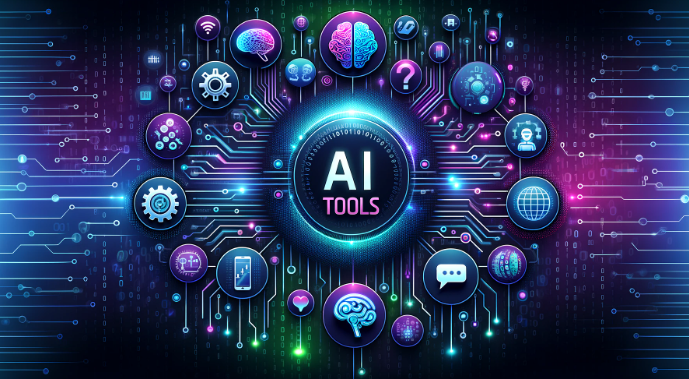In the ever-evolving world of digital business, staying ahead means embracing cutting-edge technologies. One of the most transformative forces today is artificial intelligence (AI). Whether you’re running a blog, managing an eCommerce store, or operating a complex SaaS platform, the right AI website tools can dramatically improve how you manage, market, and scale your online presence.
From automating customer support to improving website speed and personalization, AI is no longer optional—it’s essential. In this post, we’ll explore the top AI tools every website owner should know, along with how they integrate with your web hosting provider or cloud hosting environment to deliver maximum impact.
1. ChatGPT and AI Chatbots
Let’s start with one of the most popular AI applications—chatbots. Tools like ChatGPT, Tidio, Intercom, and Drift have revolutionized online customer interaction.
Why It Matters:
-Provides instant customer support 24/7
-Reduces the burden on human agents
-Boosts customer satisfaction and engagement
These AI chatbots can handle FAQs, process basic orders, or even escalate complex issues to a live representative. Most modern web hosting providers allow easy integration with chatbot widgets via CMS platforms like WordPress, Shopify, and Joomla.
2. Surfer SEO / Clearscope (AI-Powered SEO Optimization)
SEO remains a cornerstone of online visibility. Tools like Surfer SEO and Clearscope use AI to analyze top-performing content and provide real-time suggestions to optimize your blog posts, landing pages, and product descriptions.
Key Features:
-Keyword suggestions based on competitor analysis
-Semantic keyword inclusion
-AI-driven readability and structure guidance
By improving AI SEO optimization, these tools directly contribute to better search engine rankings. Combined with a high-speed cloud hosting service, you can deliver optimized content faster to users around the world.
3. Hotjar and Crazy Egg (AI-Powered Heatmaps)
Understanding how users interact with your website is crucial. Hotjar and Crazy Egg leverage AI to generate heatmaps and behavior analytics that show where users click, scroll, and spend the most time.
Benefits:
-Optimize site layout and call-to-actions
-Reduce bounce rates
-Enhance user experience through informed design changes
These insights can help you refine your website UI/UX, which is especially important if you’re using shared hosting or VPS plans from your web hosting provider where performance is tied closely to design efficiency.
4. Canva Magic Studio and Adobe Firefly (AI Design Tools)
You don’t need to be a graphic designer to create beautiful visuals anymore. Tools like Canva’s Magic Studio and Adobe Firefly use AI to generate high-quality images, logos, banners, and social media posts.
How This Helps Website Owners:
-Quicker content production for blogs and ads
-Better visual branding
-Time and cost savings
If you manage your website on platforms like Wix or WordPress, AI design tools seamlessly integrate with media libraries, making your content marketing faster and more effective.
5. Jasper AI and Writesonic (AI Content Generators)
Need to write product descriptions, blog posts, or newsletters? Jasper AI and Writesonic are powerful content-generation platforms that use AI to create human-like copy in seconds.
Ideal For:
-E-commerce stores looking to scale product pages
-Bloggers and affiliate marketers
-Agencies managing multiple websites
Pairing these tools with a solid web hosting provider ensures your website can handle increased traffic from more frequent content updates.
6. Google PageSpeed Insights & NitroPack (AI Performance Optimization)
Website speed directly impacts bounce rate, SEO, and conversions. Google PageSpeed Insights uses AI to analyze your site and offer actionable fixes. Tools like NitroPack take it further by applying AI-based performance enhancements in real time.
Optimizations Include:
-Lazy loading images
-Compression and minification
-Smart caching
These AI tools are a game changer for owners using cloud hosting solutions, where faster server response times combined with smart front-end optimization deliver exceptional performance.
7. Grammarly and Hemingway Editor (AI Writing Assistants)
High-quality, error-free writing boosts your website’s credibility. Grammarly and Hemingway Editor use AI to polish your content, improve grammar, and enhance readability.
Why It’s a Must:
-Ensures professional content
-Reduces editing time
-Improves SEO and user experience
These tools integrate easily with most content management systems and are a great complement to AI content generators.
8. AI-Powered Email Marketing: Mailchimp & Constant Contact
Modern email marketing platforms like Mailchimp and Constant Contact use AI to analyze audience behavior, recommend send times, and personalize messaging for better results.
Features Include:
-Smart segmentation
-Predictive analytics
-Automated A/B testing
Email marketing remains one of the highest ROI strategies, especially when paired with a reliable web hosting provider that ensures email deliverability and site uptime.
9. AI Analytics with PaveAI and Zoho Analytics
Understanding analytics is tough, but PaveAI and Zoho Analytics use machine learning to convert raw Google Analytics data into actionable business insights.
What They Do:
-Auto-generate performance reports
-Identify key traffic sources
-Provide conversion path analysis
Using these AI analytics tools helps you continuously refine your website strategy and performance.
Final Thoughts
As a website owner in 2025, you don’t need a huge budget or a full tech team to take advantage of AI. With the right AI website tools, you can automate tasks, gain insights, improve design, boost SEO, and deliver personalized experiences—all while saving time and money.
To truly unlock the power of these tools, ensure you pair them with a web hosting provider that supports scalability, security, and fast loading times. Whether you choose shared hosting, cloud hosting, or VPS hosting, your infrastructure should match the intelligence of the tools you use.

